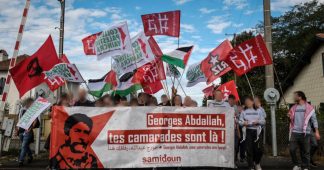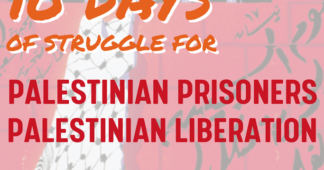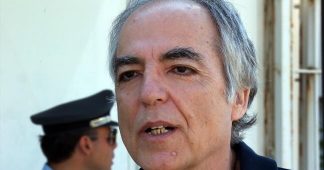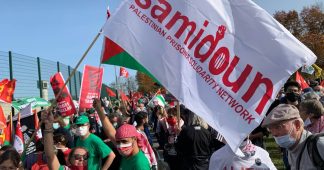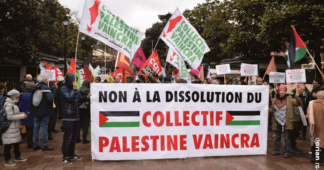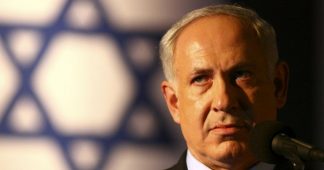Μαυ 22, 2022
Samidoun Palestinian Prisoner Solidarity Network salutes Japanese internationalist and revolutionary, Fusako Shigenobu, on the day of her liberation in Tokyo, alongside her daughter May and all of the comrades and friends who have stood by this courageous freedom fighter throughout nearly 22 years in Japanese prisons.
Like Georges Abdallah in France, Fusako Shigenobu is and was an internationalist struggler for the liberation of Palestine, deeply engaged in the revolutionary movement that swept the world and found expression through direct engagement in anti-imperialist struggle, particularly the Palestinian struggle. Fusako is a co-founder of the revolutionary organization, the Japanese Red Army (JRA), which struggled for a revolutionary future for Japan as well as working hand in hand with Palestinian revolutionaries in the Popular Front for the Liberation of Palestine (PFLP) for a liberated Palestine.
Fusako Shigenobu worked directly with Ghassan Kanafani when she worked with the PFLP’s public and international relations office where Al Hadaf, the Front’s magazine, was published. She facilitated the making of the film, “Red Army/PFLP Declaration of World War” and wrote many reports and calls to action for Japanese leftist newsletters and magazines, urging action for Palestine.
Three Japanese fighters for Palestine took part in a military operation at al-Lydd airport (“Ben Gurion Airport”) and had planned to sacrifice their lives in the operation. One fighter, Kozo Okamoto, however, was captured and imprisoned for decades until being released in a prisoner exchange with the Palestinian resistance.
Fusako was forced to live underground, where she gave birth to and raised her daughter, May Shigenobu, while serving as the leader of the Japanese Red Army. While the JRA engaged in armed struggle, it eventually became an organization engaged in grassroots solidarity organizing in support of Palestinian liberation. Fusako was detained in Japan in 2000 in Osaka and taken to Tokyo; she has been imprisoned since that time, writing books and poetry. She has continued to hold firm to her anti-imperialist principles and her commitment to Palestinian liberation.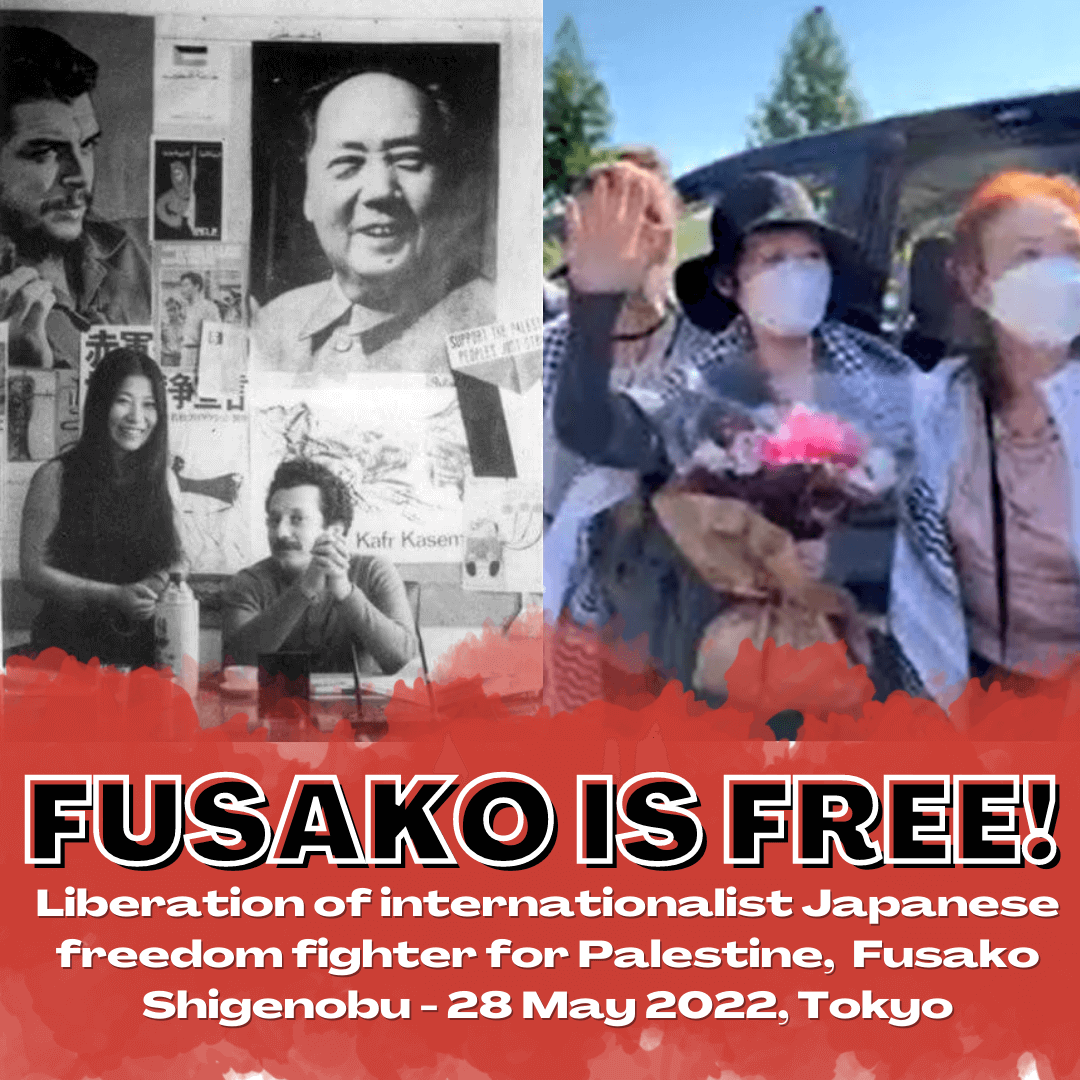 Fusako Shigenobu’s legacy of internationalist commitment and sacrifice for Palestinian liberation is an honorable, inspirational life of struggle that reminds all of us of our responsibility to act, to organize and to resist imperialism. On this day of her liberation, we salute her and all those who have struggled alongside her, and we pledge to act to move the day forward of the liberation of all prisoners of the Palestinian cause and the anti-imperialist struggle, from the Zionist jails to the imperialist prisons of the U.S. and France, and beyond.
Fusako Shigenobu’s legacy of internationalist commitment and sacrifice for Palestinian liberation is an honorable, inspirational life of struggle that reminds all of us of our responsibility to act, to organize and to resist imperialism. On this day of her liberation, we salute her and all those who have struggled alongside her, and we pledge to act to move the day forward of the liberation of all prisoners of the Palestinian cause and the anti-imperialist struggle, from the Zionist jails to the imperialist prisons of the U.S. and France, and beyond.
From the river to the sea, Palestine will be free!
Read the bio of Fusako Shigenobu below prepared by Fusako’s daughter May and fellow comrades, and follow the Instagram account @freedomfighterfu and the Facebook Fusako Shigenobu page for more details.
Fusako Shigenobu Bio/Story
Fusako Shigenobu (1945- ) is a political prisoner, poet, writer, mother, and revolutionary fighter for the liberation of Palestine. She was imprisoned for 21.5 years after dedicating her life to the fight against global imperialism.
She joined the student movement in the late 1960s while attending night school at Meiji University in Tokyo and gradually became committed to revolutionary politics, and later joined the Red Army Faction (RAF) in 1969. The RAF was a communist party that advocated for revolution against the imperialist governments of the U.S. and Japan. Fusako became one of the senior leaders in 1970 and was tasked with starting an International Relations Bureau.
In 1971, Fusako left Japan due partially to her disagreement with Mori Tsuneo, the new default leader of RAF after mass arrests of its leadership. But the main reason for leaving Japan was to seek international solidarity with other ongoing revolutions and struggles against imperialism around the world. She headed to the Middle East after she learned about the Palestinian struggle against Israeli occupation.
Upon arriving in Lebanon on March 1, 1971, Fusako started working with the Popular Front for the Liberation of Palestine (PFLP), a secular Marxist-Leninist organization founded by Palestinian doctor George Habash. Fusako started her solidarity work at the PFLP’s Public Relations office and magazine publication center, Al Hadaf. This was an era with very limited access to media and information, so her main focus was dispersing the information she gained about the Palestinian struggle and about the situation in the Middle East back to Japan by writing reports for Japanese leftist newspapers and magazines, as well as corresponding with different activists, artists, medics, journalists, and other specialists to encourage them to come and volunteer in the Palestinian camps or inform the Japanese public and create grassroots support.
In May 1971, she helped introduce Masao Adachi and Koji Wakamatsu to the Palestinian freedom fighters Fidayeen and facilitated the making of their film Red Army/PFLP Declaration of World War. She accompanied them to Jordan’s Jarash mountain Palestinian camp where they filmed the first-ever footage of Palestinian fighters in the Fidayeen’s daily life. These Fidayeen were massacred only two days after they left.
On May 30, 1972, three Japanese men volunteered to take part in a military operation at Lydda Airport (known to Israelis as Ben Gurion Airport ) that targeted Aharon Katzir, the lead scientist for Israel’s biological weapons. Twenty-five civilians were killed in the crossfire with Israeli security forces. Israel denied access to an international inquiry commission to investigate how so many civilians were killed in the incident. An independent investigation would have revealed who was responsible for killing civilians.
The three Japanese volunteers had planned to sacrifice their lives during the operation by using hand grenades, but one participant Kozo Okamoto survived and was captured. In the Israeli interrogation, it was revealed that he was a Red Army Faction (RAF) member. The three volunteers called themselves the Arab Red Army, and this was leaked to the Israeli media. The Israeli media named them the Japanese Red Army and thus the name existed before the organization came into existence in 1974.
Fusako was forced underground in fear of Israeli reprisal against the Japanese working with the Palestinian liberation movement. Even though Fusako had no involvement in the operation, Israel attempted to assassinate her by bombing the buildings where she resided. I Decided to Give Birth to You Under an Apple Tree, 2001).
Around this time, she became pregnant with her daughter who was born on March 1, 1973. Fusako and her daughter May lived underground for the next 28 years. May was named after the Japanese word for revolution (Kaku-mei) with the Kanji character meaning “life.”(命)
While remaining underground, the Japanese volunteers for the PFLP decided to create a political organization in 1974. Fusako became the leader and spokesperson for this internationalist leftist revolutionary organization that took on the name Japanese Red Army (and Arab-Red Army in its early stages). They conducted several operations against capitalist-imperialist entities such as the Shell corporation in Singapore (1974), as well as demanding the release of political prisoners by occupying the French Embassy in the Hague (1974) and the US Consulate in Kuala Lumpur in (1975).
After the JRA became an independent entity in 1974, it sought to ensure that civilians would not be harmed in any future operations. After a change in policy, all their militaristic operations ceased by the late 1980s. The group decided to continue their work by focusing on grassroots support and solidarity with the Palestinian people.
Fusako states, “The reasons we aborted the 1970s-style armed struggle was because along with the UN recognition of Palestinians (and due to the many deaths) my thinking was to cherish life in every struggle.”
Fusako authored 10 books while living underground and in prison, including a book of poetry. In her first book, My Love, My Revolution (1974), Fusako wrote: “I would like to see people brought up to help each other regardless of borders.”
In November 2000, Fusako was arrested in Osaka and taken to Tokyo. On many occasions, Fusako has publicly taken accountability for past JRA actions and apologized to all those unnecessarily harmed. On April 14, 2001, she dissolved the Japanese Red Army and stated she would continue the same work in Japan through legal means. The government charged her with two counts of passport forgery and alleged that she must have “conspired” in the planning of the 1974 hostage-taking operation at the French Embassy in the Hague (an operation that is well known to have been planned by the PFLP Waddie Haddad and led by Carlos, which injured one guard). The prosecution presented no concrete evidence of Fusako’s involvement and relied heavily on forced confession statements taken in the 1970s that were retracted by those witnesses on the stand during the trial. Disregarding such retractions, the judge sentenced her in 2005 to 20 years of imprisonment for possibly conspiring a “attempted manslaughter”.
Akin to other political prisoners, Fusako has been excessively punished because she openly challenges the legitimacy of the Japanese monarchy and government for perpetuating imperial systems of domination and discrimination. From prison, she wrote, “Japan is not a divine nation; we should become a humane nation.” (December 2000)
In 2008, she was diagnosed with colon and intestinal cancer and underwent three surgeries. In a 2017 letter from Hachioji Medical Prison in Tokyo, Shigenobu writes:
“If anti-nuclear protestors and anti-war protestors can join forces, they can change the future. I am hopeful…You could say that the world is ripe for revolution, in material terms. As long as humanity continues to be denied, the global humanist revolution will surely take place in a future generation.”
We remind our readers that publication of articles on our site does not mean that we agree with what is written. Our policy is to publish anything which we consider of interest, so as to assist our readers in forming their opinions. Sometimes we even publish articles with which we totally disagree, since we believe it is important for our readers to be informed on as wide a spectrum of views as possible.
